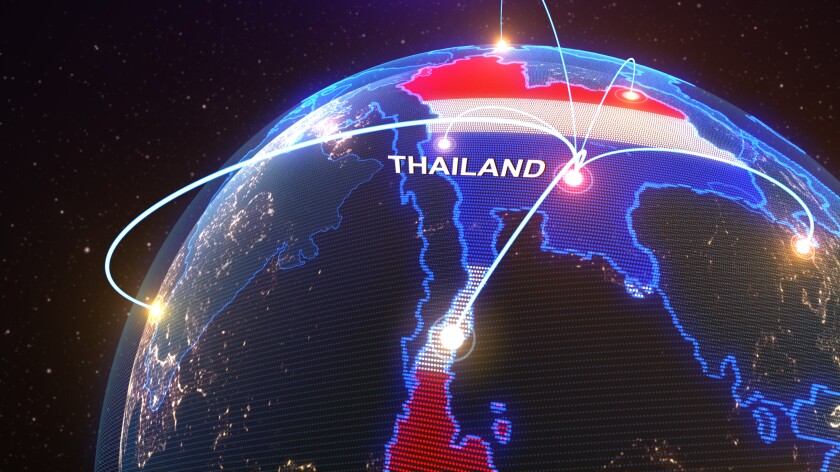Market overview
In the dynamic landscape of 2023, the technology, automotive, engine manufacturing, and battery technology sectors experienced significant growth in cross-border deals, driven by advancements and increased consumer demand. Meanwhile, AI, semiconductors, and electric vehicles emerged as focal points for investment and innovation.
Conversely, sectors such as healthcare, financial services, retail, and hospitality faced a slight slowdown, due to the aftermath of the pandemic and shifting consumer behaviours. M&A activity mirrored these trends, with sectors embracing innovation seeing heightened activity, while others contended with economic volatility.
Both private and public M&A transactions drive the Thai market. While public M&A deal volumes have seen an increase, private M&A remains more common, as it mostly involves private companies and tends to involve smaller transaction sizes, making it more accessible.
Public M&A transactions are prevalent in the TMT, logistics, oil and gas, and infrastructure sectors. In contrast, private M&A thrives in the e-commerce, retail, renewable energy, food and beverage, and real estate sectors, often due to the nature of the entities involved and the scale of businesses acquired. Additionally, foreign investors may hesitate to invest in listed companies to avoid triggering mandatory tender offer requirements.
Several significant M&A transactions completed in Thailand in 2023. One notable example is the cross-border M&A transaction involving the sale of the KFC business in Thailand by Restaurants Development Co. Ltd., a major KFC franchisee with over 280 restaurants and 4,500 employees, to Devyani International DMCC, a subsidiary of Indian-listed Devyani International Limited, valued at approximately THB 4.5 billion.
Another remarkable M&A transaction in 2023 involved Universal Music Group, the world leader in music-based entertainment, acquiring a 70% shareholding in a joint venture valued at THB 1.6 billion with RS Music, one of Thailand’s most successful music and entertainment companies. Since completion, the joint venture now owns and manages a music catalogue of over 10,000 songs and related content, including music videos, lyrics, compositions, pictures, photographs, and other rights under licence agreements. The catalogue includes over 960 popular and well-known artists.
These deals, involving well-known brands in the Thai market, sparked widespread discussion and scrutiny within the public sphere. Their completion necessitated thorough legal analysis and a deep understanding of the business and local market dynamics, given their unique complexities, scale, and cross-border aspects.
Economic recovery
In 2023, the technology, automotive, engine manufacturing, and battery technology sectors showed an upward trend compared with 2022. This growth was fuelled by a strong emphasis on innovation and sustainability goals within these industries. Notably, there has been growing interest among consumers in Thailand towards electric vehicles, contributing to the momentum in the automotive sector and related businesses.
Digital disruption is steering M&A trends in Thailand. The technology industry – particularly e-commerce, fintech, and e-entertainment – is once again attracting more attention from investors, including listed companies and financial institutions eager to diversify their business portfolios to adapt to current business trends and achieve greater synergies, whether as an operator or a service provider. Investments in the form of joint ventures, venture capital investments, and strategic collaborations continue to be preferred, offering quicker sector entry while requiring a lower capital commitment.
Tax considerations and foreign ownership restrictions play a significant role in shaping deal structures. Fixed pricing remains prevalent, aiming to expedite deal closure and avoid post-completion adjustments, especially in large-scale transactions where bidding or auction sales may be preferred by Thai sellers seeking broader buyer interest. Concurrently, Thai conglomerates are diversifying into sectors such as technology, renewable energy, healthcare, and life sciences to mitigate investment risks and enhance competitiveness in a swiftly evolving economy. Moreover, the ability to exit investments, through trade sales or IPOs, is gaining prominence for buyers venturing into new business realms or experiencing rapid growth, such as in startup ventures.
Financial investors and private equity play an active role in shaping M&A transactions in Thailand, particularly in terms of M&A documentation, which is now aligning more closely with international practices. This includes price mechanisms, the scope of warranties and indemnities, warranty qualifications, limitations of liabilities, and the use of warranty and indemnity (W&I) insurance.
In addition, due diligence on Thai target companies is becoming more focused on regulatory matters, particularly environmental and data privacy aspects.
Private equity investors and venture capitalists are increasingly willing to take on minority interests alongside existing owners due to foreign ownership restrictions under the Foreign Business Act, B.E. 2542 (1999) (FBA). These restrictions prevent foreigners (i.e., foreign entities or Thai entities with 50% or more foreign-owned capital) from engaging in restricted businesses in Thailand.
Legislation and policy changes
The principal legislation governing private M&A transactions in Thailand is the Civil and Commercial Code, with the Department of Business Development and the Ministry of Commerce serving as the main regulatory bodies.
For public M&A transactions, the primary legislation is the Public Limited Companies Act, B.E. 2535 (1992) and for a public company listed on the Stock Exchange of Thailand (SET) or that has made securities available to the public, the Securities and Exchange Act, B.E. 2535 (1992) (the SEC Act) applies. The Office of the Securities and Exchange Commission of Thailand (SEC) and the SET are the main regulatory bodies for public deals.
The Office of the Trade Competition Commission of Thailand (OTCC) oversees merger control in Thailand in general, with the Trade Competition Act, B.E. 2560 (2017) (TCA) being the main legislation. This act governs and regulates M&A activities that may result in monopoly, market dominance, or a substantial reduction of competition in a relevant market, excluding sectors regulated by specific legislation, such as telecommunications, broadcasting and television, and energy.
With effect since early 2023, parties involved in M&A deals in Thailand have two options for consolidating private companies:
An amalgamation – a consolidation where two or more companies are combined, which results in one new separate company being formed; and
A merger – a consolidation where two or more companies are merged, which results in only one company remaining.
The introduction of this new merger scheme allows greater flexibility for business acquisitions and reduces legal obstacles in business/asset transfer deals, thereby promoting and facilitating M&A transactions in Thailand. However, despite its potential benefits, the new merger scheme has not gained widespread adoption among investors, primarily due to unfamiliarity and uncertainty surrounding the associated regulations.
Currently, the formation of a joint venture for investing in a new business is not regulated by the merger control provisions of the TCA. However, establishing a joint venture by acquiring an existing business may be deemed an indirect acquisition of shares or assets of the target company and may be subject to the TCA. The OTCC is reviewing and revising the merger control regime, with the revised scheme anticipated to potentially include joint ventures.
Practice insight/market norms
While the concept of a nominee shareholder may be acceptable in certain jurisdictions, it is illegal for Thais to act as nominee shareholders to enable a foreigner to operate a business in circumvention or violation of the foreign ownership restrictions under the FBA or the Land Code. Given that nominee structures are often seen in Thai companies with different classes of shares, it is a common misconception that nominee structures are legally permissible and enforceable under Thai law.
When structuring an M&A transaction involving foreign entities, clarification is often sought regarding the foreign ownership restrictions applicable to foreigners in Thailand. However, the legal implications of using nominee structures – which are still seen in industries such as real estate, tourism, agriculture, and retail – tend to receive less attention.
Furthermore, investors sometimes overlook the requirement for merger control clearance, as it is a relatively new concept in the Thai market. Nevertheless, there has been an increasing number of rulings and precedents regarding the Thai merger control regime under the TCA.
Due to the travel restrictions and social distancing requirements imposed during the past few years, most M&A transactions during this period were conducted remotely, a practice that largely continues. The use of virtual data rooms for due diligence, remote closing, electronic exchange of signature pages, and conducting board and shareholders’ meetings via electronic means have become quite common in Thailand.
Notwithstanding the above, while electronic signatures are generally recognised under Thai law, they are not widely used in commercial transactions. The Thai authorities still require the use of wet-ink signatures for official documents, and there are insufficient court rulings on the use of electronic signatures. However, there has been an increasing trend, especially in cross-border deals, towards the use of electronic signatures, with documents signed via trusted software that can verify the identity of the signer through a secure system.
Public M&A
The takeover rules under the SEC Act set out the key requirements for a tender offer for the shares of a public company listed on the SET. An acquirer is required to make a mandatory tender offer to purchase all the shares and equity-linked securities of the target company if they acquire a quantity that reaches or exceeds thresholds of 25%, 50%, or 75% of the total voting rights. The mandatory tender offer also applies to intermediaries or the ultimate holding company that controls the target; this is known as the ‘chain principle’ rule.
In addition to the mandatory tender offer, an acquirer that purchases shares of the target company without triggering the tender offer threshold may submit a voluntary tender offer to obtain control of the target company. This allows the offeror to announce a tender offer for all, or a portion of, the shares and specify the minimum percentage of shares it wishes to purchase.
Another significant factor for public and private M&A transactions is the restrictions on foreign shareholdings under the FBA. Due to these restrictions, a foreign investor may decide to make a partial tender offer for less than 50% of the target’s shares, requiring approval from the shareholders’ meeting of the target company and the SEC, subject to conditions specified in the relevant notification issued by the SEC.
An unsolicited bid can be structured similarly to a non-hostile bid, through a mandatory or voluntary tender offer. However, due to the lack of recognition for minority squeeze-outs under Thai law, hostile bids are not commonly used in practice.
While parties may set conditions for a voluntary tender offer, a mandatory tender offer is unconditional. The conditions for launching a voluntary tender offer usually include approval from the relevant regulatory authorities and the offeror's board of directors or shareholders, and/or securing relevant third-party consents.
In recent years, following the full implementation of the merger control regime and the increase in high-profile public M&A transactions in Thailand, more attention has been paid to merger clearance in voluntary tender offers. Additionally, provisions related to a material adverse change (MAC) clause may be included as a condition to the acquisition of shares.
Moreover, under Thai public takeover rules, a tender offer may generally be withdrawn if:
There is severe damage to the status or assets of the target company during the tender offer period, not caused by the offeror; or
There is a material decrease in securities value during the tender offer period due to any frustrating action taken by the target company, unless these are stated in the tender documents and no objection is raised by the SEC.
Break fees are not commonly employed in public M&A transactions in Thailand. Rather, public M&A deals are usually protected by non-refundable deposits or exclusivity undertakings to safeguard offerors. Nonetheless, when a break fee is used, Thai courts award damages based on actual loss, meaning the quantum of the break fee can be adjusted at the court’s discretion.
Private M&A
The most frequently used consideration mechanisms in Thailand are fixed price and completion accounts. Although the use of locked-box mechanisms has increased in recent years, they are less prevalent compared with other purchase price mechanisms. Earn-out mechanisms are occasionally used, particularly when the founders or executives are locked in for several years after closing.
While the use of W&I insurance has grown in cross-border M&A transactions, particularly where one of the parties is a private equity investor, it remains uncommon among Thai investors. This is due to unfamiliarity, high costs, product limitations, and coverage exclusions and limitations of liabilities among Thai parties. Nevertheless, some Thai-listed companies are open to the use of W&I insurance in outbound M&A transactions.
Apart from MAC clauses, the requisite regulatory approvals and all licences and permits critical for the operation of the target business are usually requested by the buyer as conditions precedent to completion. Additionally, merger control clearance is increasingly significant at the deal structuring stage, as market participants become more accustomed to the legal requirements following the full implementation of the merger control regime in Thailand.
It is common practice to adopt foreign governing laws in cross-border M&A transactions. Thai courts generally recognise and enforce a contractual choice of foreign law, especially when one of the parties is a foreign entity or individual. This is subject to the general reservations that it is not contrary to public order or the good morals of the people of Thailand, and the foreign law must be proven to the Thai courts as appropriate. Recognition of the foreign governing law may be easier if a share purchase agreement governed by foreign law is enforced outside Thailand, such as through foreign arbitration or a foreign court.
In Thailand, the most prevalent exit strategies are trade sales and IPOs, which are commonly found in private equity transactions. Exit options, such as the right to initiate a trade sale or an IPO once the target business achieves the desired valuation, can be – and often are – included in shareholders' agreements.
Looking ahead
The expectation for 2024 is a continuation of the increase in cross-border deal flow. The authors anticipate expansive growth in the technology, automotive, engine manufacturing, and battery technology sectors. In view of this, joint ventures, bolt-on acquisitions, and strategic collaborations will continue to play a crucial role in M&A transactions. Operators in the aforementioned sectors will actively seek investment opportunities, business partners, and financial sponsors.
Regarding the legal industry, a notable adaptation in practices has been observed, with many law firms integrating AI to assist in tasks such as due diligence and the preparation of legal documentation. Lawyers are poised to seize opportunities arising from the transformation of their clients’ businesses and industries, driven by technological and digital advancements.



